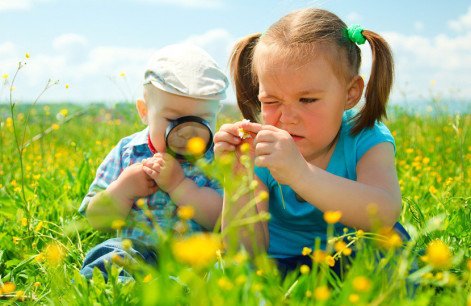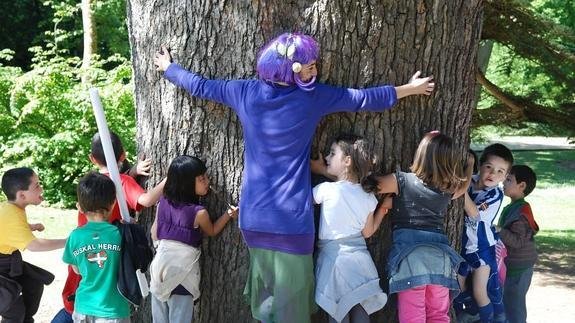Nature, a great source of learning for children
When we walk in the middle of nature with the little ones, our gaze does not see beyond what our visual angle allows us, we ignore to observe carefully what that look teaches us. Sometimes a second is enough to listen, to fix the attention and value every detail, gesture, sound, shape or color, this is a sample of the benefits of nature in children.we are accomplices in the daily activity of the abandonment of resources looking beyond what the natural environment offers us, obstructing or even stopping research, observation, experimentation and manipulation as a starting point for optimal learning. This learning, based on the temporal and natural evolution of the brain, goes beyond the relationship between letters, numbers, contents and programming locked in millions of papers that contain the classrooms.

source
In maturation, until approximately 6 years of age, the benefits of nature in children are very great, since the natural environment acts as a fundamental tool for sensory exploration, enrichment and movement control, improvement of self-control and the ability to focus attention and respect. The same natural environment, in which neuronal interconnection is defined in the first stages of development, is what allows learning to relate, to observe, to think in a reasoned way and to feel good about oneself. This continuous interaction with the natural environment activates the neural network mechanism, allowing a child to exercise responsibility, freedom and safety in future maturation stages. The tandem brain-learning, involves a process where the whole organism is involved and directed towards a certain goal, although it is the brain that acts as a receiver and filter of stimuli, information processor, registry and database, issuer of answers and development of skills and abilities, thus allowing learning and teaching at the same time thanks to the neural network. This neural network is built gradually, and as such the learning proposals must be developed.
¿Why does nature have that power of attraction for children?
First, because nature embodies movement, and children like what moves. A bird that flies, the grass swayed by the wind, a row of ants that advances, the clouds moving through the sky, a falling leaf, all this attracts your attention with much more strength than a book,On the other hand, nature is a completely sensory universe, you can smell the pines, the flowers, the horse droppings, you can hear the birds singing, the splash of a stream of water, you can touch very different textures. roughness of the bark of a tree, the softness of a petal. Between twelve months and two years, the child lives a stage of its development very marked by the sensory-motor aspect and in nature, finds stimuli that correspond to their needs.

source
¿Is the attitude of parents during walks or excursions decisive?
Parents can transmit respect for the flowers, for the plants not everything can be started at any time and in any place, for the insects in no case must be stepped on, and can encourage an attitude of discretion if you want to see a bird up close , you have to know how to be still and in silence. Without these basic values, nature will not be delivered to you.
¿Is the presence of animals a reason for the success of nature among children?
Well surely. There is a kind of complicity between the smallest and the animals, perhaps because they evolve in a non verbal register and communicate without words. The approach to the chickens or to the piglets in a rural house or a school farm is for them a thrill. And it will also make them understand that the same word is used to designate the pink piglet drawn in a story and the huge animal of flesh and bone. A breakthrough in your learning.
Encouraging the interaction of children with the natural environment favors autonomy, understanding and relationship, initiative, research, analysis and critical spirit from its early stages of development.
This reminds me of an early childhood education book/module. I think i've written about it somewhere before, totally agree with the points above